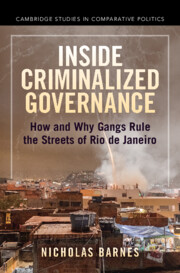Book contents
- Inside Criminalized Governance
- Cambridge Studies in Comparative Politics
- Inside Criminalized Governance
- Copyright page
- Dedication
- Contents
- Figures
- Tables
- Acknowledgments
- A Note on Translation
- Abbreviations, Acronyms, and Translated Words
- 1 Introduction
- 2 Criminalized Governance
- 3 A Theory of Criminalized Governance
- 4 The Origins of Criminalized Governance
- 5 Comando Vermelho of Nova Holanda
- 6 Comando Vermelho of Parque União
- 7 Terceiro Comando (Puro) of Complexo da Maré
- 8 Criminalized Governance during Military Occupation
- 9 Conclusion
- 10 Epilogue
- Appendices
- References
- Index
- Other Books in the Series (continued from page ii)
1 - Introduction
Published online by Cambridge University Press: 06 February 2025
- Inside Criminalized Governance
- Cambridge Studies in Comparative Politics
- Inside Criminalized Governance
- Copyright page
- Dedication
- Contents
- Figures
- Tables
- Acknowledgments
- A Note on Translation
- Abbreviations, Acronyms, and Translated Words
- 1 Introduction
- 2 Criminalized Governance
- 3 A Theory of Criminalized Governance
- 4 The Origins of Criminalized Governance
- 5 Comando Vermelho of Nova Holanda
- 6 Comando Vermelho of Parque União
- 7 Terceiro Comando (Puro) of Complexo da Maré
- 8 Criminalized Governance during Military Occupation
- 9 Conclusion
- 10 Epilogue
- Appendices
- References
- Index
- Other Books in the Series (continued from page ii)
Summary
This chapter begins by motivating the puzzles the book seeks to answer. Why do Rio de Janeiro’s drug-trafficking gangs govern neighborhoods? Why do some of these gangs rely on violence and coercion while others resolve disputes, offer welfare, and organize cultural activities for residents? This book argues that gangs govern in these ways because they need the obedience and support of local residents to survive amid shifting relations with rival gangs and the police. This chapter outlines a theory of criminalized governance which revolves around the relations that emerge between gang members and residents within distinct security environments. This theoretical framework builds on three traditions that view criminalized governance akin to processes of state formation, rebel governance, or state perversion. Finally, this chapter outlines its mixed method approach, and describes the methodological and ethical considerations involved in eighteen months of participant observation in three rival gang territories, 206 semi-structured interviews with residents and gang members, and the collection of more than 400 archival documents and a dataset of more than 20,000 anonymous denunciations.
Keywords
- Type
- Chapter
- Information
- Inside Criminalized Governance , pp. 1 - 31Publisher: Cambridge University PressPrint publication year: 2025

